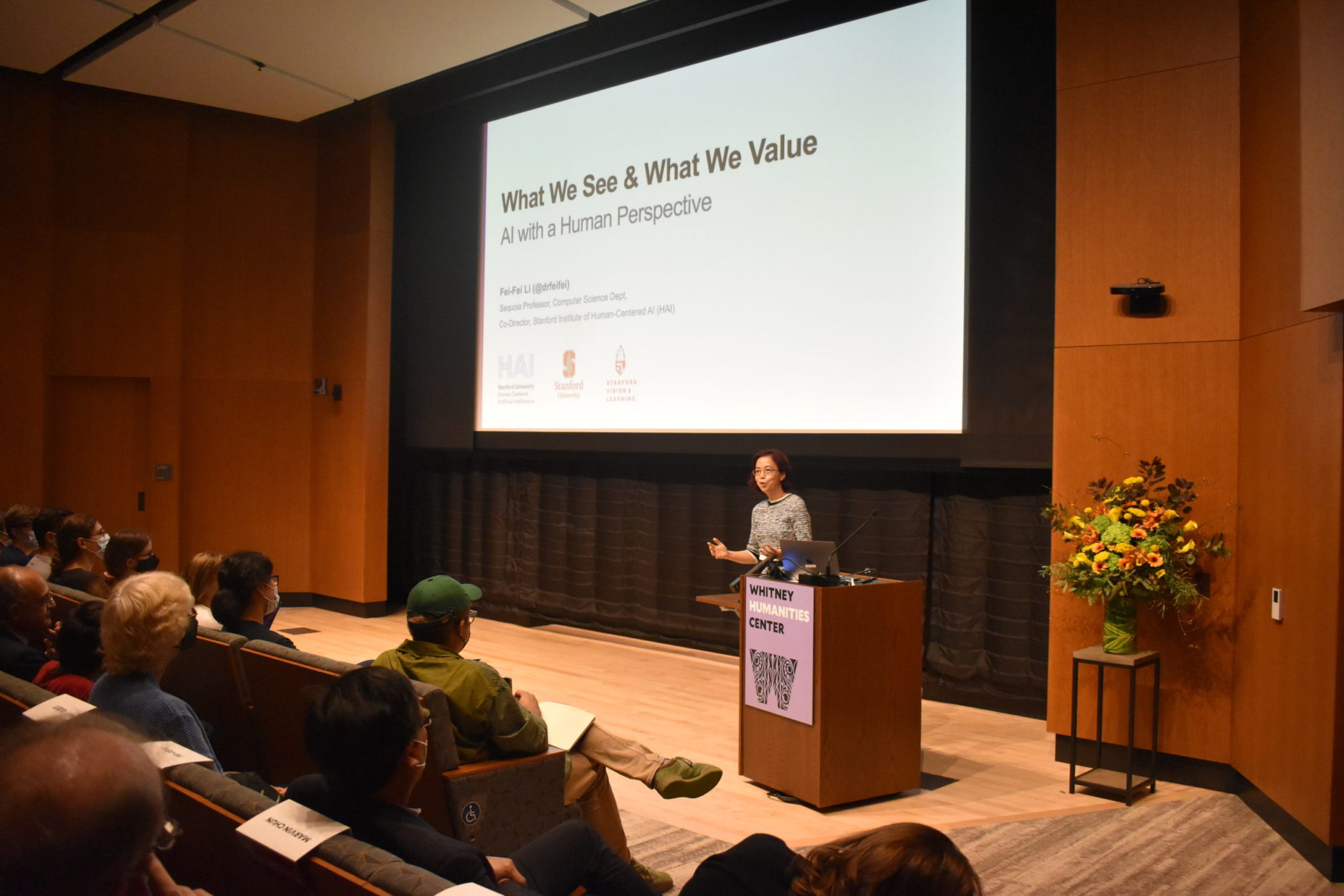Fei-Fei Li delivers 2022 Tanner Lecture on AI and its impacts on humanity
The Stanford computer scientist addressed Yalies in a gripping conversation on human perspective and artificial intelligence.

Courtesy of the Whitney Humanities Center
At a Tanner Lecture on Wednesday, acclaimed Stanford professor of computer science and Co-Director of the Human-Centered AI Institute Fei-Fei Li discussed the profound impacts of humanistic artificial intelligence.
Li was a vice president at Google and chief scientist of artificial intelligence/machine learning at Google Cloud while on sabbatical during the 2017-18 academic year. Her work centers on ethics of developing algorithms and artificial intelligence. Li is also the creator of ImageNet, a crucial project and substantial dataset that has aided in the most recent advancements in deep learning and AI.
During the lecture, Li said that ImageNet has used neural network algorithms to achieve success in object recognition in the field of computer vision.
“Some people call it the fourth industrial revolution,” Li said of object recognition. “The field of computer vision has really blossomed because of it.”
The Tanner Lectures on Human Values, founded by the University of Utah’s Obert Clark Tanner and Grace Adams Tanner, aim to instill intellectual promise and moral awareness — breeding courage and introspection of one’s place in society.
The lectures are held across seven participating universities — Yale, Oxford, Stanford, Cambridge, University of California, Berkeley, University of Michigan and University of Utah — during the 2021-22 and 2022-23 academic years. This event was open to the public and organized in collaboration with the Whitney Humanities Center.
“As humanists, we at the [Whitney Humanities Center] collaborated across campus, with a reach far greater than usual,” Diane B. Brown, associate director of the Whitney Humanities Center, told the News. “We personally invited faculty and graduate students from computer science, data science, psychology, philosophy and beyond. We conceived of this public lecture — and a private event tomorrow — as truly transdisciplinary.”
According to Brown, psychology professor Marvin Chun had described Li as one of the most influential researchers in the history of AI.
In 2012, the winning algorithm of the ImageNet object classification challenge, called AlexNet, cut the generalization error significantly and opened a new era in the deep learning revolution. ImageNet has been used in around 40,000 citations and provides universal data for image classification.
In her lecture, Li discussed preventing the looming effects of AI on society. People, she said, must come to understand the true nature of non-artificial artificial intelligence: made by humans, meant to behave like humans, and therefore affecting humans too.
Li argued how visual perception and intelligence are deep and contextual — meaning that AI must reflect these nuances with sensitivity. Li aims to make the fuzzier dimensions of human experience a part of AI, noting that “relationships between objects must be coded.”
“We want to build technology that helps humanity,” Li told the News.
Li described a motivation to improve human condition by using AI in a constructive fashion through exploring social and ethical dimensions in robust algorithms. During her lecture, she carefully examined the intersection of visual and artificial intelligence in enabling computers to envision what humans see.
She also analyzed the problem of labor threat with existing labor shortages, noting that “AI should be augmenting and not replacing human capabilities.” Li also explained how AI can be used to improve the quality of life, including through easing burdens for doctors who work in overworked emergency rooms.
Brown wrote that Li “eloquently showed the human stakes of AI” by explaining “how AI can augment, not replace, human labor.”
“I was skeptical in the beginning, but it is interesting as you study these things, you begin to learn more about yourself,” Robert Orr, an attendee and an urbanist from the New Haven area, told the News. “It is our peculiarities, our differences, and when they gel, that’s when things begin to happen.”
Past Tanner lecturers have included Elaine Scarry, Salman Rushdie, Oliver Stacks and Judith Butler.







